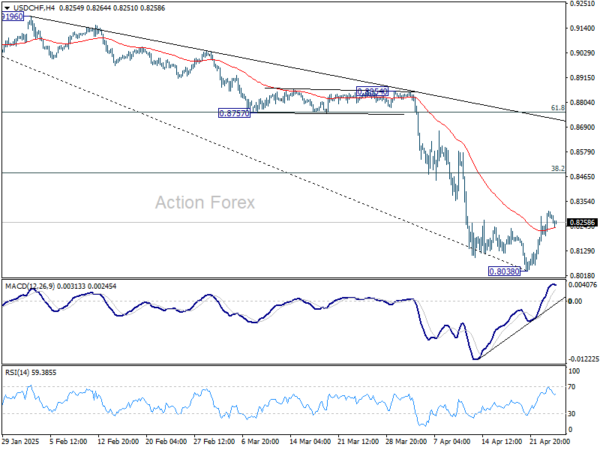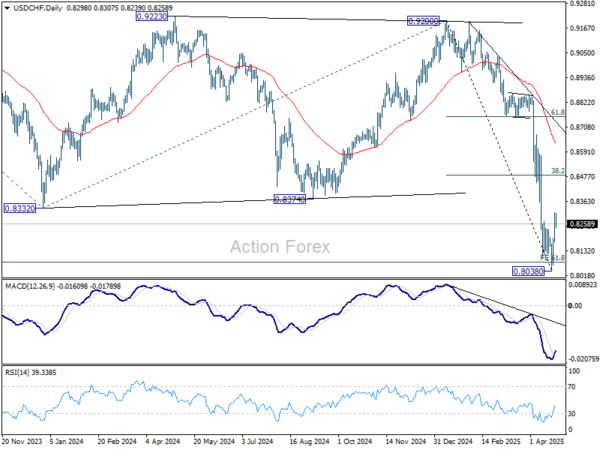Dollar Rebound Stalls as US-China Trade Talks Hit a Wall – Action Forex
The forex markets remain subdued today, with all major pairs and crosses trading inside yesterday’s range. After a brief bounce, Dollar’s recovery appears to be losing momentum. While it’s too soon to confirm whether the rebound has fully run its course, fading trade optimism is clearly starting to weigh on sentiment, especially as the broader macro picture continues to be dominated by uncertainty surrounding US trade policy.
One of the key sources of hesitation remains the unresolved state of US trade negotiations. Despite market hopes earlier in the week for progress, there has been no meaningful development between the US and its key trading partners regarding tariff reductions. More critically, the much-anticipated talks with China appear not to have even started at all—deflating sentiment that had briefly lifted risk assets and commodity currencies earlier in the week.
China’s Ministry of Commerce poured cold water on any speculation of near-term breakthroughs, stating unequivocally that there are “absolutely no negotiations” currently underway with the US on trade. The Foreign Ministry further emphasized that reports of ongoing talks or agreements are “false news,” and reiterated that Washington must first cancel its unilateral measures for talks to begin. The firm stance from Beijing signals a hardening of positions, making the path toward de-escalation far less certain than previously hoped.
For now, Dollar and other major currencies are in wait-and-see mode, with traders looking for more concrete signals before re-engaging decisively. As for the week so far, Kiwi is still sitting at the top of the performance ladder, followed by Aussie, and then Sterling. On the weaker side, safe-haven currencies continue to lag, with Swiss Franc underperforming, followed by Euro and Yen. The Dollar and Loonie position in the middle of the pack.
In Europe, at the time of writing, FTSE is down -0.19%. DAX is down -0.24%. CAC is down -0.03%. UK 10-year yield is down -0.048 at 4.515. Germany 10-year yield is down -0.049 at 2.455. Earlier in Asia, Nikkei rose 0.49%. Hong Kong HSI fell -0.74%. China Shanghai SSE rose 0.03%. Singapore Strait Times fell -0.01%. Japan 10-year JGB yield fell -0.014 to 1.310.
US durable goods orders surge 9.2% mom on transportation demand, but underlying momentum stalls
US durable goods orders soared by 9.2% mom in March to USD 315.7B, far surpassing expectations of a 1.5% mom gain. The sharp rise was driven almost entirely by a surge in transportation equipment, which jumped 27% mom to USD124.6B, marking a third consecutive monthly increase.
Orders excluding defense also posted a strong 10.4% mom gain to USD 300.0B, highlighting a significant boost in civilian aircraft and related components.
However, the underlying momentum in business investment appeared far less robust. Core orders excluding transportation were flat at USD 191.1B, missing forecasts for a modest 0.2% mom increase.
US initial jobless claims rise to 222k, matched expectations
US initial jobless claims rose 6k to 222k in the week ending April 19, matched expectations. Four-week moving average of initial claims fell -1k to 220k. Continuing claims fell -37k to 1841k in the week ending April 12. Four-week moving average of continuing claims fell -1.5k to 1864k.
ECB’s Nagel and Lane warn of growth hit from tariffs, downplay recession risk
German ECB Governing Council member Joachim Nagel acknowledged today that Germany faces significant downside risks to growth due to US tariffs.
“As far as economic growth is concerned, which of course also depends on the level of the respective tariffs, the impact in Europe will also be significant for Germany,” he warned.
But on inflation, “we are relatively certain that the impact on inflation in the US will be stronger than in the euro zone,” Nagel added.
Separately, ECB Chief Economist Philip Lane told Bloomberg News that while the tariff shock will likely drag on Eurozone growth, the region is not on an automatic path toward recession.
Lane emphasized the bloc’s diversified trade relationships beyond the US, which could act as a cushion against a more severe downturn.
German Ifo climbs slightly to 86.9, but rising uncertainty signals turbulence ahead
Germany’s Ifo Business Climate Index edged higher in April, rising from 86.7 to 86.9 and beating market expectations of 85.2. Current Assessment Index climbed to 86.4 from 85.7. Expectations, while slightly lower at 87.4 compared to March’s 87.7, still surpassed the anticipated 85.0.
However, a closer look at the sectoral breakdown reveals growing divergence and fragility. Manufacturing sentiment deteriorated further, dropping from -16.6 to -18.1, while trade confidence took a notable hit, falling from -23.8 to -27.0. On the other hand, modest gains in services (from -1.1 to -0.8) and construction (from -24.3 to -21.9) offered some relief, though both remain firmly in negative territory.
The Ifo Institute cautioned that “uncertainty among the companies has increased,” adding that “the German economy is preparing for turbulence.”
USD/CHF Mid-Day Outlook
Daily Pivots: (S1) 0.8215; (P) 0.8264; (R1) 0.8355; More….
USD/CHF’s rebound from 0.8038 is still in progress and intraday bias stays mildly on the upside. However, strong resistance should be seen from 38.2% retracement of 0.9200 to 0.8038 at 0.8482 to limit upside. On the downside, break of 0.8038 will resume larger down trend.
In the bigger picture, long term down trend from 1.0342 (2017 high) is still in progress and met 61.8% projection of 1.0146 (2022 high) to 0.8332 from 0.9200 at 0.8079 already. In any case, outlook will stay bearish as long as 55 W EMA (now at 0.8794) holds. Sustained break of 0.8079 will target 100% projection at 0.7382.


